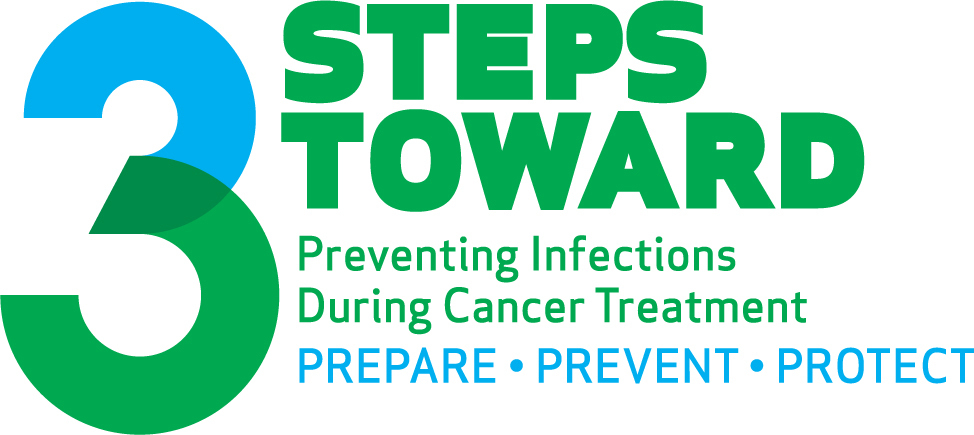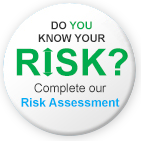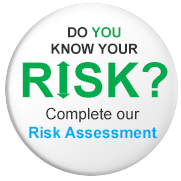
Health Tip Sheet
Understanding Your Risk for Infection During Chemotherapy
What Is an Infection?
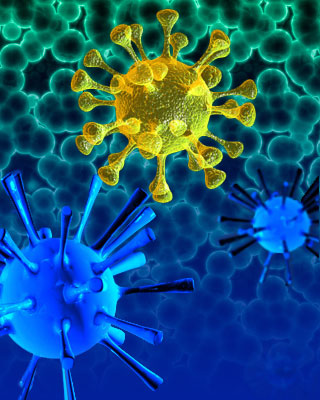 It’s important for you to understand what an infection is before you learn about the things that might put a person at a higher risk for getting one. An infection occurs when germs enter a person’s body and multiply, causing illness, organ and tissue damage, or disease.
It’s important for you to understand what an infection is before you learn about the things that might put a person at a higher risk for getting one. An infection occurs when germs enter a person’s body and multiply, causing illness, organ and tissue damage, or disease.
It’s also important for you to know that an infection can lead to a potentially life-threatening complication called sepsis. It’s very important to call your doctor immediately if you get an infection or develop any other signs or symptoms of an infection.
Some common germs and infections include the following:
- Bacteria: Very small microorganisms. Some types of bacteria enter the human body from the air, water, soil, or food, and can cause infections and disease. Common bacterial infections include pneumonia, bronchitis, and ear infections.
- Virus: A very simple microorganism that may cause illness or disease. Viral infections are passed on from other people. Common viral infections include the common cold, herpes, and flu.
Your immune system helps your body protect against these germs. Cancer and chemotherapy can damage this system, reducing your number of infection-fighting white blood cells and making it harder for your body to fight infection from germs.
Who Is at Risk?
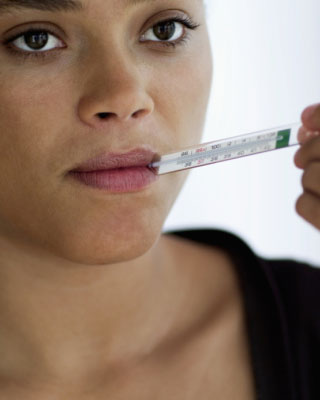 People receiving chemotherapy may be at risk for getting infections. You are likely to be at higher risk between 7-12 days after you have received each chemotherapy does–and possibly lasting for 5-7 days, when your white blood cells are at their lowest numbers. This period of time is often called your nadir, meaning “lowest point.” This period varies slightly depending upon the chemotherapy drug, or combination of drugs, used. Your doctor and/or nurse will let you know exactly when your white blood cell count is likely to be at its lowest.
People receiving chemotherapy may be at risk for getting infections. You are likely to be at higher risk between 7-12 days after you have received each chemotherapy does–and possibly lasting for 5-7 days, when your white blood cells are at their lowest numbers. This period of time is often called your nadir, meaning “lowest point.” This period varies slightly depending upon the chemotherapy drug, or combination of drugs, used. Your doctor and/or nurse will let you know exactly when your white blood cell count is likely to be at its lowest.
There are certain risk factors that may make it more likely for you to develop serious infections while your white blood cell count is low:
- You are 65 years or older.
- You are female.
- You are unable to take care of yourself without assistance and are bed-bound.
- You have lost a lot of weight in a short time (unintentional weight loss).
- You have another condition that makes it more difficult to fight off infections (i.e., diabetes, kidney disease, high blood pressure, congestive heart failure, an autoimmune disease, liver disease, chronic bronchitis, or emphysema).
- You have a type of cancer that affects the blood or lymph nodes (for example, leukemia).Your cancer has spread to other parts of the body.
- You have had chemotherapy or radiation in the past.
- You are receiving more than one chemotherapy drug.
- The chemotherapy that you are receiving is strong. The stronger the chemotherapy, the more of your white blood cells will be killed, making your immune system weaker. Strong chemotherapy may also make your immune system weaker for longer, which also increases your risk for getting an infection.
- Your doctor or nurse has told you that you have a low white blood cell count in the past.
Talking to Your Doctor or Nurse About Your Risk
Remember, although following these infection prevention steps will help you from picking up germs, no matter how careful you are, you may still get an infection. If you do develop an infection during your chemotherapy treatment, it is important to know that it is not your fault!
To find out more about the risks for getting an infection during your chemotherapy treatment, speak with your doctor or nurse. Below are some questions that you can ask:
- Will the cancer treatment I am receiving make me more likely to develop a low white blood cell count?
- Am I at increased risk for getting an infection because of my medical history or other things?
- If I get an infection, how severe is it likely to be, and how long might it last?
- Will you do anything special to help keep me from getting infections?
- What can I do to lower my risk for infection?
- How will I know if I have an infection?
- What should I do if I think I have an infection?
- If I get a fever (increase in body temperature), does that mean I have an infection?
- How will you decide how to treat my infection?
- What will you do if the treatment does not get rid of my infection?
- What are the likely side effects of the proposed treatments for infection?
- What other factors might increase my chances of getting an infection?
